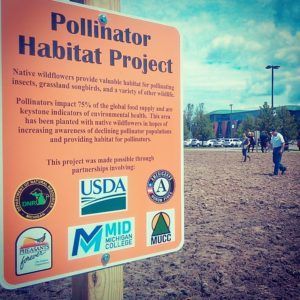MUCC Celebrates Pollinator Week at Partnership Event in Mt. Pleasant
On Tuesday, June 18, Mid Michigan College hosted a pollinator workshop and designated a half-acre plot of campus land as pollinator habitat. In partnership with the Michigan DNR, Pheasants Forever, Huron Pines AmeriCorps and the NRCS, MUCC was proud to take part in the event and celebrate pollinators.
The event kicked off at 11:00 A.M. with presentations from DNR Wildlife Biologist Bruce Barlow and Mid Michigan College faculty regarding the goals of the project, the importance of pollinators and how to manage your own property for pollinator habitat. In addition to these presentations, a variety of local groups representing different Michigan conservation organizations and clubs set up information tables and answered questions from attendees about their programs. Autumn and I both engaged in great conversations with event attendees regarding MUCC and conservation in Michigan, as well as the On the Ground and Wildlife Cooperative programs.
attendees about their programs. Autumn and I both engaged in great conversations with event attendees regarding MUCC and conservation in Michigan, as well as the On the Ground and Wildlife Cooperative programs.
Due to their vastly declining populations and the critical role they play in sustaining ecosystem health, pollinators have been of increasing concern to conservation agencies around the world. Some of the main threats pollinators face are habitat loss, pesticide usage and climate change. Although there is no cover-all cure for the challenges faced by pollinators, regular citizens can still have a big impact on these important species by planting native grasses and flowers on their property (no matter the size of the plot planted). As emphasized by Mid Michigan College faculty during the presentations, every effort counts in the race to conserve pollinators and their habitat.
After an hour of discussions and educational presentations, more than 30 volunteers went outdoors to begin laying down the native flower and grass seeds provided by the DNR and Pheasants Forever. It didn’t take long to empty three five-gallon buckets of seed mix, and within a half hour volunteers made their way back indoors for refreshments and raffle prizes.
Initiated by the faculty at Mid Michigan College’s Mt. Pleasant campus, this half-acre plot has been in progress for the past two years. Bruce Barlow of the DNR and the local Pheasants Forever chapter played a direct role in coordinating with the faculty to ensure its success. Due to the planting completed by the volunteers, it is expected that this plot will resemble a restored tallgrass prairie within three years. As the seeds develop in the seed bank and are given the opportunity to compete with previously-established vegetation, native plants will eventually dominate the plot. Although managed for pollinators, this grassland habitat will benefit a variety of fauna that includes turkeys, pheasants, songbirds and deer. The native vegetation and their deep root systems will also aid in improving soil and water quality.
The post MUCC Celebrates Pollinator Week at Partnership Event in Mt. Pleasant appeared first on Michigan United Conservation Clubs.
Recent Posts



